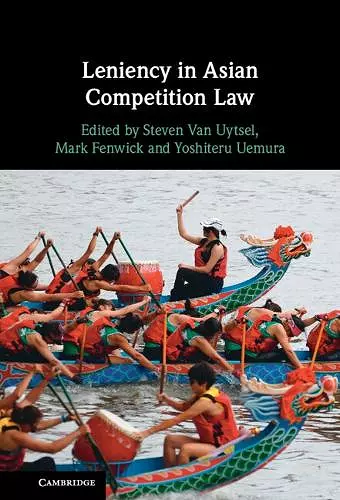Leniency in Asian Competition Law
Exploring the effectiveness of leniency programs in Asia
Steven Van Uytsel editor Mark Fenwick editor Yoshiteru Uemura editor
Format:Hardback
Publisher:Cambridge University Press
Published:22nd Sep '22
Currently unavailable, and unfortunately no date known when it will be back

This volume provides an in-depth analysis of leniency programs in Asia, exploring their effectiveness and the responses from cartel participants. Leniency in Asian Competition Law is a crucial resource for understanding competition law in the region.
In Leniency in Asian Competition Law, scholars, policymakers, and practitioners come together to explore the emergence of leniency programs in Asia, a unique tool designed to combat cartel formation through competition law. This volume delves into the various forces that have influenced the development of these programs and examines how cartel participants are reacting to them. By providing a platform for firms to disclose their involvement in illegal cartel activities, leniency programs offer the possibility of reduced penalties or immunity from sanctions, encouraging cooperation with authorities.
The experimentation with leniency programs spans across nine Asian jurisdictions, showcasing a diverse landscape of approaches. This book highlights three main dimensions of this experimentation: the revision of previously established leniency programs, the introduction of newly crafted ones, and the choice to forgo creating a leniency program altogether. Each jurisdiction's experience contributes valuable insights into the effectiveness and adaptability of these mechanisms in addressing cartel behavior.
As the first empirical analysis of leniency programs in Asia, Leniency in Asian Competition Law presents a comprehensive examination of how these measures have evolved in response to challenges faced by competition lawyers and policymakers. Local and international experts contribute their knowledge, offering a thorough introduction to this rapidly developing area, and exploring the theoretical, international, and regulatory contexts surrounding leniency programs in the region.
'This book offers a comprehensive understanding on the critically important topic of leniency in Asian competition law.' D. Daniel Sokol, Carolyn Craig Franklin Chair Professor in Law and Business, Gould School of Law, University of Southern California
'Leniency has already achieved remarkable success in eliciting confessions from cartel participants; nevertheless, leniency programs across the globe have not converged, with markedly different scorecards among countries. Getting out of this impasse requires case studies, together with solid theoretical inquiries. This book, the first large-scale study on leniency in Asia, presents a refreshing answer to this challenge. It is a pleasure to read this meticulously constructed book, with a sharply focused introduction, followed by countries' case studies, not only of Asia (including China) but also of the pioneering US and EU, conducted by first-rate scholars in each country.' Toshiaki Takigawa, Professor Emeritus, Faculty of Law, Kansai University, Osaka
ISBN: 9781009152709
Dimensions: 236mm x 159mm x 32mm
Weight: 849g
360 pages